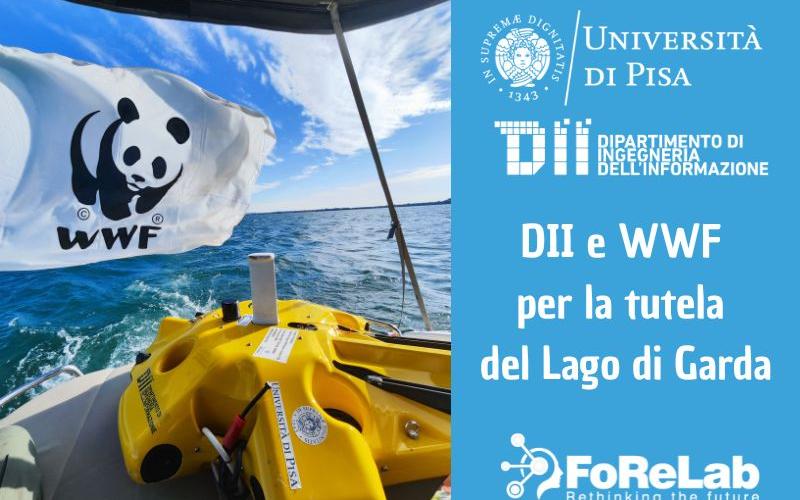Due giorni di missione del nostro team di robotica subacquea assieme a staff e volontari del WWF per cercare rifiuti di plastica nel Lago di Garda
Leggi tuttoSENSORNAUTA

Responsabile: Prof. Lorenzo Pollini
Università di Pisa
Dipartimento di Ingegneria dell’Informazione
Progetto finanziato nel quadro del POR FESR 2014-2020
Bando RS 2 2017 - Progetti di ricerca e sviluppo delle MPMI
Progetto: SENSORNAUTA
SAPR Multi-Sensore a Ricarica e Navigazione Automatiche
![]()
SENSORNAUTA ha l’obiettivo di realizzare e sperimentare un Sistema Aeromobile a Pilotaggio Remoto (SAPR o “drone”) in grado di eseguire il più ampio ventaglio di operazioni specializzate, con un grado di automazione superiore ai sistemi attualmente in commercio. Le caratteristiche peculiari del sistema sono:
- integrazione di più sensori di diverso tipo, quali fotocamere e radar
- navigazione automatica con funzionalità di collision-avoidance e gestione autonoma della missione dipendente dai dati acquisiti
- ricarica automatica delle batterie in modalità wireless
Con l’integrazione di tali tecnologie, SENSORNAUTA si colloca nel contesto dell’Internet of Things, espandendo le potenzialità del sistema drone, rendendolo una soluzione all-in-one e permettendo una riduzione dei costi (sensori, hardware e software della stazione di terra, etc.).
SENSORNAUTA si rivolge in primo luogo agli operatori SAPR e, attraverso questi ultimi, si propone come soluzione in vari settori in cui il SAPR è stato recentemente introdotto come strumento di acquisizione dati. I principali sono: agricoltura di precisione, monitoraggio di impianti industriali e di produzione energetica, monitoraggio ambientale, rilievo di terreni, edifici e opere civili, sorveglianza, supporto in operazioni di polizia, soccorso, antincendio e protezione civile.
Il Progetto SENSORNAUTA si sviluppa attraverso varie fasi che includono la definizione di requisiti di utente e gli scenari di impiego, la definizione dell’architettura della piattaforma SAPR e dei moduli che la compongono, lo sviluppo e la validazione di questi ultimi, e infine i test del sistema in scenari d’impiego rilevanti.
Le Attività del DII verteranno sui due fronti: lo sviluppo di un modulo autopilota con gestione autonoma della missione, e l'eleborazione dei segnali acquisiti dal payload con lo scopo di determinare modifiche autonome alla missione.
Il costo previsto per queste attività inclusivo del finanziamento dalla regione Toscana ' di circa 240 K€.
![]()
SENSORNAUTA has the objective of creating and testing a Remotely Piloted Aircraft System (SAPR or "drone") able to perform the widest range of specialized operations, with a degree of automation superior to the systems currently on the market. The peculiar characteristics of the system are:
- integration of several sensors of different types, such as cameras and radar
- automatic navigation with collision-avoidance functionality and autonomous management of the mission dependent on the acquired data
- automatic recharging of batteries wirelessly
With the integration of these technologies, SENSORNAUTA is placed in the context of the Internet of Things, expanding the potential of the drone system, making it an all-in-one solution and allowing a reduction in costs (sensors, hardware and software of the ground station, etc.).
SENSORNAUTA is aimed primarily at the SAPR operators and, through the latter, is proposed as a solution in various sectors in which the SAPR has recently been introduced as a data acquisition tool. The main ones are: precision agriculture, monitoring of industrial plants and energy production, environmental monitoring, survey of land, buildings and civil works, surveillance, support in police operations, rescue, fire prevention and civil protection.
The SENSORNAUTA Project develops through various phases that include the definition of user requirements and the operational scenarios, the definition of the architecture of the SAPR platform and the modules that compose it, its development and validation, and finally the tests of the system in relevant use scenarios.
The activities of the DII will focus on two topics: the development of an autopilot module with autonomous management of the mission, and the elaboration of the signals acquired from the payload with the aim of determining autonomous changes to the mission.
The estimated cost for these activities including the financing from the Tuscany region is around 240 K€.




